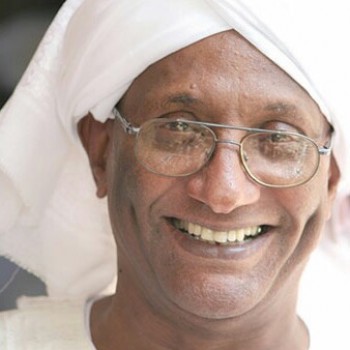A Tear of Nugud: a Pearl Tear

By: Abdullah Ali Ibrahim
March 3, 2021
Unlike many communists, I believed that the party’s secret cadre should write a critique about life in hiding from the security systems among black Sudanese. I know that our professor Abdul Khaleq Mahjoub himself was not comfortable with what Omar Mustafa Al-Makki wrote in Al-Midan newspaper about his six years underground during Abboud’s rule. The Communists’ excuse for remaining silent about this experience is that they may need it. But we did not ask them to write about stealth techniques, but about the wonderful (and perhaps not-so-wonderful) men and women who provided them with extraordinary courage. I myself lived for years underground in the seventies, and I bear witness that the sacrifice, nobility, and generosity of those who sheltered me, whether individuals or nuclear or extended families, is what confirmed my passion for change, while the comrades who entered that arena together for the cause fell in my eyes. Revealing that experience is access to the code of the culture of perseverance, chivalry, and love of freedom that is deeply rooted in our people and their laboring forces.
One of the most creative things I read after his death was a critique of a speech entitled “Secrets of a Special Operation” by Dr. Al-Fatih Omar Mahdi, an ophthalmologist at the Nile Hospital. This operation was performed on Sheikh Mohammed Saleh (65 years old), a citizen of Khartoum. The timing of the operation was the evening of the Eid Al-Adha vigil in Room No. 4. The hospital was empty of everyone except the doctor, his wife, and his mother. Dr. Mahdi gave the workers a two-day holiday leading up to Eid. Al-Fatih said to Mohammad Saleh:
– The left eye has white water, and the right eye has a clot and black water.
The Sheikh smiled at God’s will and destiny. He handed his eyes over to the doctor. This was the strangest operation performed by Dr Mahdi. It has never happened that he operated on a patient without a crowd of family and friends around him. The doctor’s wife could not bear the loneliness of the place and the man’s “negligence.” Tears welled up in her eyes. When the operation was completed and the eye was revealed, it seemed to the patient that he could not believe what he saw of tears. He looked at the doctor’s face and said playfully:
-I was telling you that it’s a problem. Thanks.
Sheikh Mohammad Saleh was a man sought by the entire state security apparatus, and it did not know at the time that he was in Room No. 4 in the hands of an ophthalmic surgeon, a trustee and a custodian. The Sheikh was Mohammad Ibrahim Naqd, secretary of the Communist Party, and his fellow doctors arranged for him to have this operation at the Nile Hospital. Mahdi was not a communist. But he approached them like he had never done in his entire life. He read a large page from their book in a way he did not expect: from a sick person who mortgaged his hands. He saw in the man’s forced loneliness and his eyes filled with harmful water while staying up late over a cause, any cause, a nobility that perhaps distorted the taste of his family themselves. He described the tear of gratitude that Nugud shone when he saw what he had not seen before the operation as “a pearl’s tear: dear with the taste of the Nile and the sweetness of Sudan.” The doctor’s family felt Nugud’s loneliness, so she took him to her apartment to recover from the hardships of the operation. They were his doctors and family members. Nugud came out when the night fell, alone, twisting about something:
O you who departed at night, alone and alone
Wait for me…wait for me
I am left at night alone, lost and alone
In the distant corridors, wait for me
In a sandhill and in the sea… wait for me
Wait for me in the rustle of wings
And the skies of displaced birds
When the shrines sigh
Dark yesterday’s sky was
Wait for me…wait for me
(From the poetry of Abu Dhikri)



